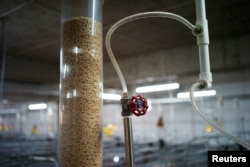Major Chinese animal feed maker Tangrenshen Group says feed produced by one of its units was contaminated with the virus that causes African swine fever, raising fears of its spread further across the country.
This was the first reported contamination of feed supplies in China and increased the concerns for pig farmers trying to avoid the disease. It also raised the economic pressure on feed manufacturers already struggling with low margins and slowing demand.
In a statement Sunday to the Shenzhen Stock Exchange, the company said the disease was found in feed samples provided by its 51 percent-owned subsidiary, Bili Meiyingwei Nutrition Feedstuff.
The discovery occurred during inspections after an outbreak of African swine fever on a farm in Qingyang county, in the eastern Chinese province of Anhui.
Tangrenshen said the origin of the disease remained unclear and the matter was still under investigation.
China has struggled to stem the rapid spread of African swine fever, which has now reached most of the country's pig-farming regions. The country produces almost 700 million pigs a year, or about half of the world's total.
Beijing earlier said many of the cases in Anhui were caused by feeding kitchen waste to pigs that was not properly processed to kill the virus.
However, many industry experts have long suspected feed supplies could be contaminated with the disease.
No cure
African swine fever, which cannot be cured and has no vaccine, is known to survive for weeks in feed ingredients like soymeal.
"I think buyers will be quite worried about purchasing feed from similar subsidiaries," said Pan Chenjun, senior analyst at Rabobank.
She added that major pig producers were already worried about how to verify the safety of their feed supplies. "If there's any contamination, it's very difficult to control."
Tangrenshen relies on animal feed for most of its income, reporting 2017 feed sales of 12.6 billion yuan ($1.81 billion).
Like many Chinese feed companies, it has recently moved into pig farming and processing. It acquired Bili Meiyingwei, also known as Shenzhen
PREMIXINVE Nutrition Co. Ltd., from Belgian feed maker INVE Belgium in 2016.
The company said the impact on its operations would be "relatively small," with Bili Meiyingwei accounting for only 2.27 percent of the group's net profit in the first nine months of 2018.
The group's shares fell as much as 6.6 percent on Monday to 4.56 yuan ($0.66).
African swine fever has ravaged small pig farms in Anhui but authorities had recently lifted restrictions in four cities there after no new cases were reported for six weeks.
That run ended at the weekend when a fresh outbreak was discovered on a farm with 8,339 pigs in Qingyang county in the south of Anhui.








